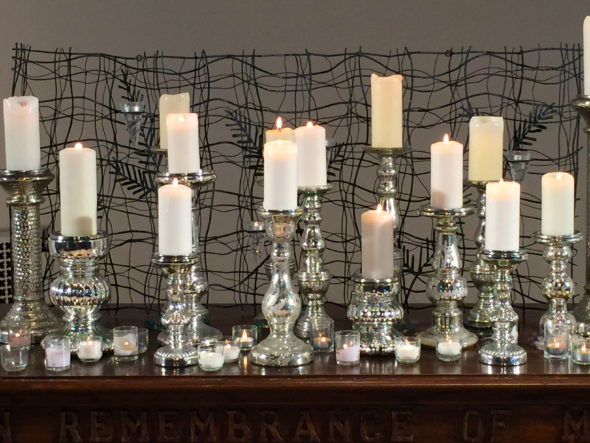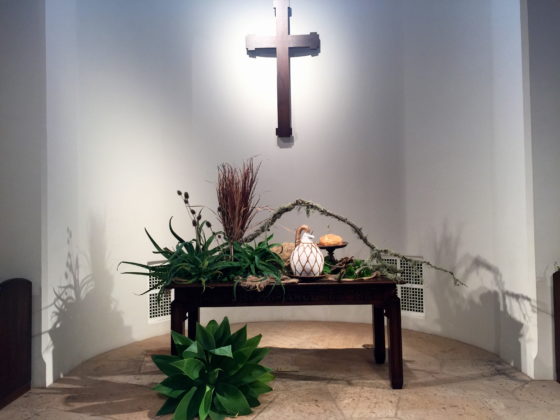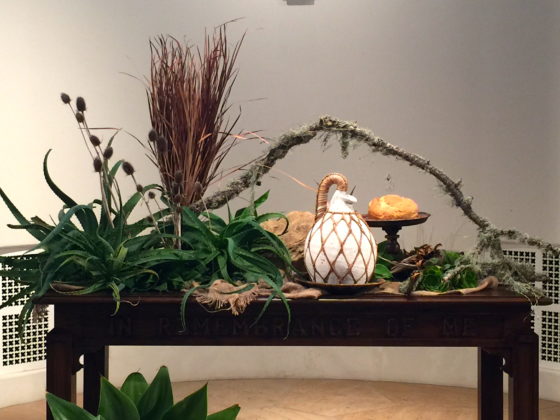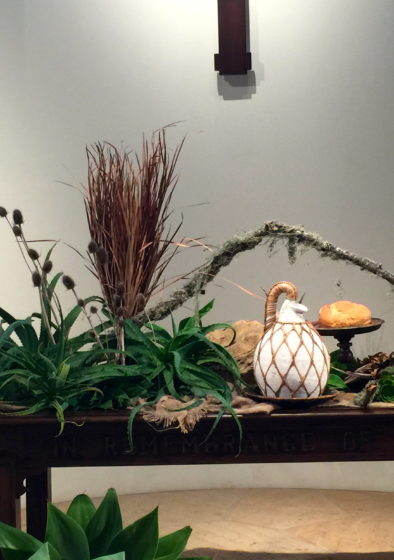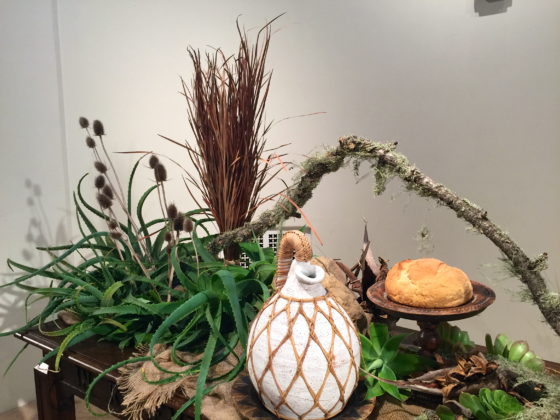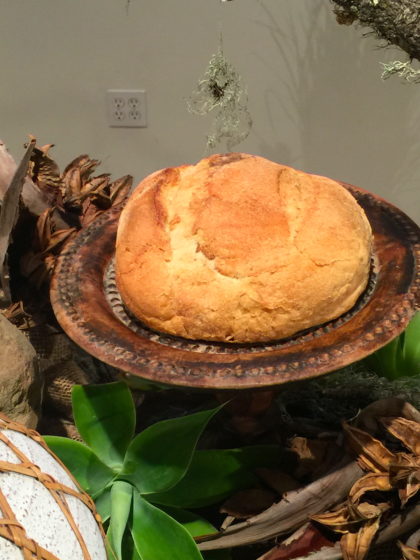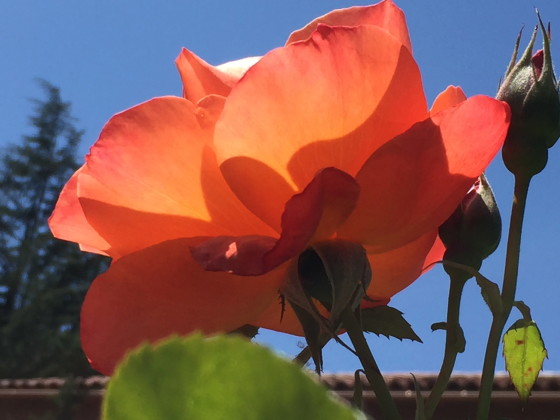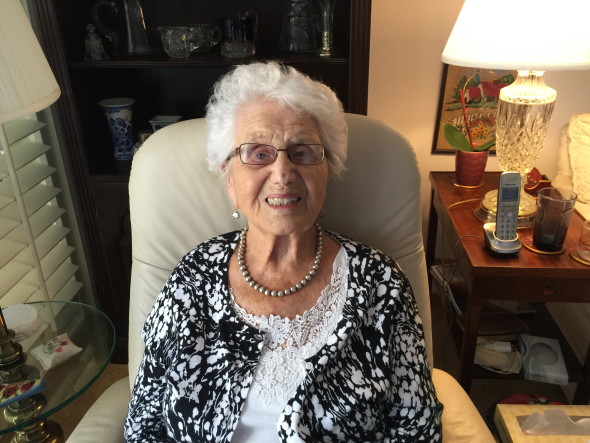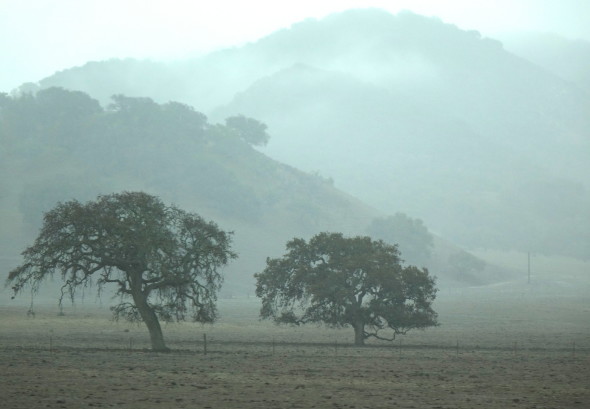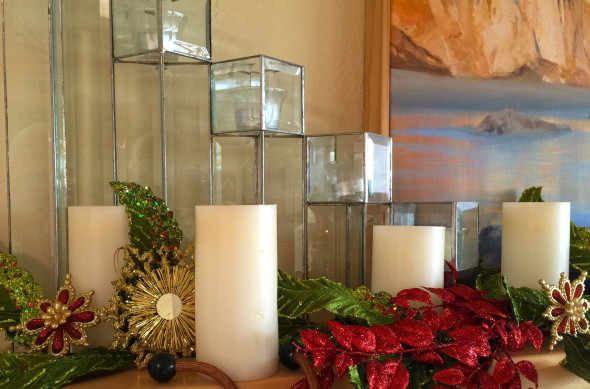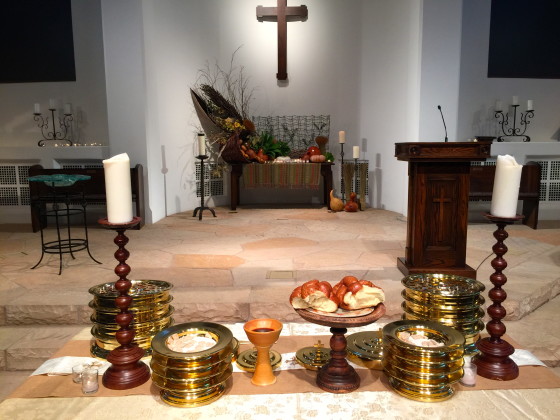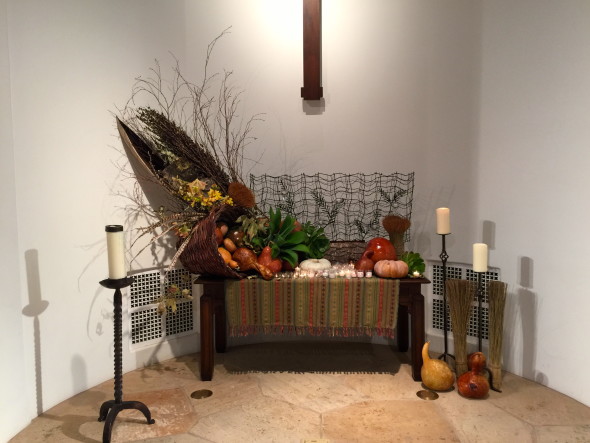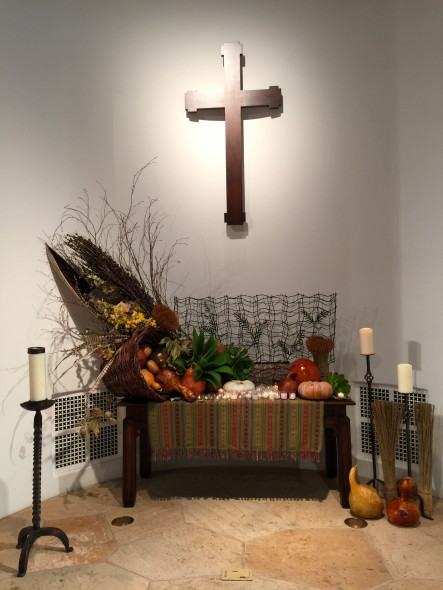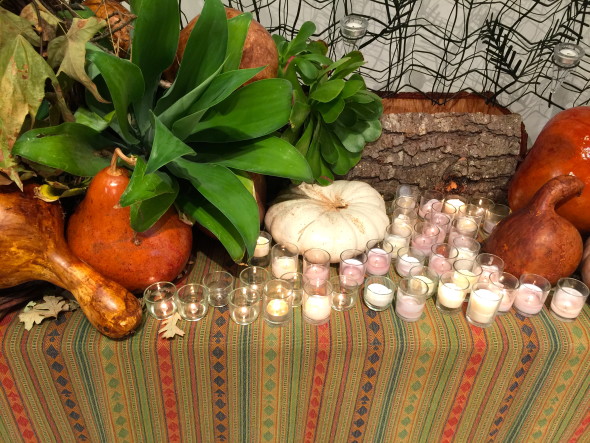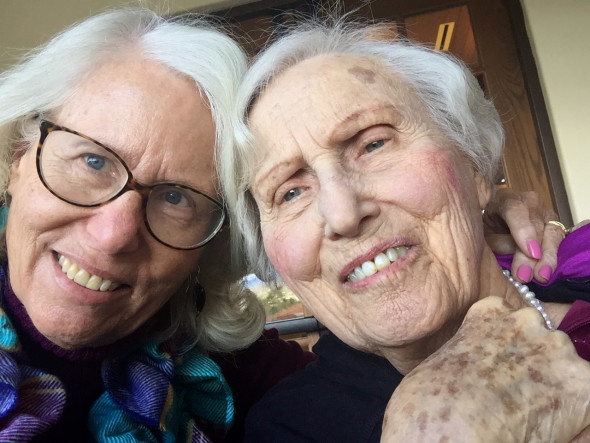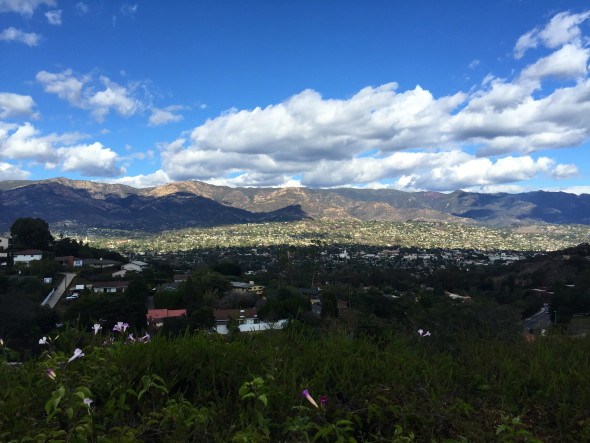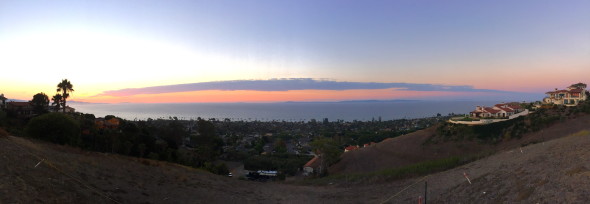The Last Word . . . and the First
Colossians 1:11-20
November 20, 2016
Montecito Covenant Church
Diana R.G. Trautwein
So. Here we are. The last Sunday of the church year, standing on the threshold of the holidays, which are barreling toward us with alarming speed. We’ve just come through — some of us, just barely! — one of the most difficult and vitriolic election campaigns in our national history.
Our pastor of eleven years has left us, heading for parts east. Many of us are reeling from personal pain and loss — illness, injury, surgery, difficult medical treatment, looming divorce, death. Some of us are dealing with school projects that feel overwhelming, or tricky relationships with friends or dorm-mates. Some of us are entertaining friends and family this next week; some of us are traveling to gather with others; some of us wonder how we’ll celebrate at all. By and large, I think it’s fair to say that many, if not most, of us in this room are carrying around multiple layers of sadness. Maybe even a sense of hopelessness,if we’re honest.
But . . . we’re here. Ready to worship, ready to listen, ready to sing, ready to pray. And, I think it is ALSO fair to say, very ready to hope.
The passage before us this morning is one that is assigned by the church lectionary, that revolving list of scriptures that takes us through most of the Bible over a 3-year span. It’s a text that beautifully expresses the theme of this day in our church calendar. And it is a passage that calls us to HOPE.
Many of the words in our sermon text today — the last six verses, in fact — actually come from what most scholars guess is an old song, a hymn of praise, something that was part of the liturgy used by the early community of Jesus followers when they gathered to worship God together.
It’s a song in two stanzas, with some lovely parallel lines and repeated words between them. And it’s a song that, in addition to its majestic, descriptive language, uses a long string of very small words. Small, but oh-so-important. Please listen for them as I read the passage for you this morning.Those little words are called prepositions. Remember those?
Hear the word of the Lord for this ‘Christ the King Sunday,’ as it comes to us from the letter to the Christians at Colossae, a smallish 1st century city which was moving steadily into the economic backwaters of its day. Somewhere in that town, a group of believers was learning what it means to live out the gospel in truth and love. This small letter was written to that small group sometime in the second half of the first century, so the words we have before us have been around for a long, long time.
They are beautiful and they are remarkable for how well they lay out a complex series of ideas about two central truths: who Jesus Christ is and who the church is. I will be reading from the New Revised Standard Version and I will actually begin with verse 11, which comes in the middle of an opening prayer for these believers.
These are the words of that continuing prayer:
May you be made strong with all the strength that comes from his glorious power, and may you be prepared to endure everything with patience, while joyfully giving thanks to the Father, who has enabled you to share in the inheritance of the saints in the light. He has rescued us from the power of darkness and transferred us into the kingdom of his beloved Son, in whom we have redemption, the forgiveness of sins.
And then, beginning with verse 15, we find that two stanza hymn — here it is:
He is the image of the invisible God, the firstborn of all creation; for in him all things in heaven and on earth were created, things visible and invisible, whether thrones or dominions or rulers or powers—all things have been created through him and for him. He himself is before all things, and in him all things hold together.
He is the head of the body, the church; he is the beginning, the firstborn from the dead, so that he might come to have first place in everything. For in him all the fullness of God was pleased to dwell, and through him God was pleased to reconcile to himself all things, whether on earth or in heaven, by making peace through the blood of his cross.
The word of the Lord.
Thanks be to God.
Whether it was the apostle Paul himself or a devoted disciple of his who penned the words of this lovely little letter, no one seems to be completely certain. Whoever it was — and for ease in understanding, I’m going to call him ‘Paul’ –I’m grateful we have this letter in our Bible, and I’m deeply grateful for the powerful truths it contains.
This is a pastoral letter, written out of deep concern for the spiritual health and well-being of a beloved group of people, people who have been visited by some ‘new’ teachers who are introducing some interesting and quite wrong-headed ideas.
Most of the letters in our New Testament were written to try and help a particular congregation through one kind of troubling situation or other, and Colossians is no exception. After the passage before us today, the letter spells out those troubling ideas a bit more clearly. Some of them seem to have Jewish roots, some of them Greek. ALL of them carry the weight of, ‘what you’ve got is not enough.’
“Well, yes, of course,” these teachers are saying. “It’s good that you’re following in the way of Jesus. But you know that’s not enough, don’t you? You need to add a few things — there are some foods which should be avoided, there are some holidays which should be observed, you’re being much too contaminated by the things of this earth and you need to live a far more rigorous lifestyle, and you should definitely be worshipping and placating the angels and the powerful astral powers all around us. You see, Jesus just isn’t enough.”
“Oh yeah,” says Paul. “I don’t think so.”
And this hymn, these lovely, strong words about the supremacy and the sufficiency of Christ alone, they are the answer to all of the “Jesus AND” kind of teaching being thrown at the Colossian church. Christ is enough. Christ is MORE than enough. Christ is . . . Well . . . let’s look at what Christ is for a minute, shall we?
The piece of that pastoral prayer that we read at the beginning of our passage today tells us that because of Jesus Christ, we are transferred from darkness into light, that we have the strength we need to endure anything that life may throw at us because we now belong to that light-filled kingdom, where sins are forgiven and we are redeemed.
Then, stanza one of this exquisitely crafted hymn tells us that Christ is the very image of the invisible God, in whom, through whom, and for whom everything was created. Not only that, but Christ came first — before any of what we see around us ever came into being — and he still — right now, this instant — holds it all together.
Digging back into the opening words in the book of Genesis, picking up imagery from the book of Exodus, borrowing from the wisdom tradition in Proverbs and the Psalms, this bold hymn threads all of it together in ways that also resonate with the glorious prologue in the gospel of John. This song is about as powerful as a song could ever be, declaring that Jesus Christ is pre-existent, pre-eminent, and supreme over the entire created order.
So . . . what was that about Jesus and . . .?
As if that wasn’t enough, stanza two adds these ideas: in addition to being the ‘firstborn of all creation, ‘Christ is the firstborn from the dead,’ indicating that by his resurrection, Christ has now ushered in a new creation, called the church, of which he is head, by which he inaugurates a new Age of Redemption and Reconciliation.
As the hymn builds to its conclusion, it begins to answer this question: what is the instrument, the means by which this new creation is made available to us? Where is that place where Old and New meet, where the First Word and the Last Word come together in one weary, beat-up, itinerant preacher? Where is the throne for this grand Cosmic Christ, this King of ALL Creation, old and new?
It’s at the top of a hill, just outside the city gates of 1st Century Jerusalem where the One in whom, “all the fullness of God was pleased to dwell,” died the death of a criminal, uttering the words, “Father, forgive them.” “Father, forgive them.”
That dying man on the tree is the very one that Paul is describing in this passage, the very one sung about in this ancient hymn from the early church. Christ, you see, is not the last name of a man named Jesus. Christ IS Jesus. Jesus IS Christ, the King of Creation, the Head of the Church, the one whose blood was shed for you and for me.
And Jesus Christ is more than enough, my friends. MORE than enough.
You know, the world we live in today — the world right here in Santa Barbara — our world no longer believes in astral powers. And it doesn’t put a lot of credence in angelology, either. Most of us aren’t bothered by anyone telling us we need to eat differently, or celebrate different religious holidays or practice some kind of strange ritual in order to be truly safe, truly saved.
But you know what? We all do battle with that same “Jesus and . . .” mentality. That scarcity mindset that subtly or not so subtly tells us we haven’t quite got it right, that there is more we need to do, more we need to know, more we need to become, more.
For some of us, that might mean that we put way too much of our trust and our hope in systems — political and economic systems. Maybe we try to maximize the benefits of those systems in some way. Maybe we believe that if we vote for one candidate or another, the world will change . . . or not change.
Maybe it’s right belief — if we just get a really good handle on this fine point of doctrine — and if we make sure that no one else deviates from it, not even a little bit, then everything will work out well, we will be safe and saved.
Maybe it’s knowledge — if we learn more, if we master this or that technique, if we put our trust in science or psychology or the arts, then we’ll know enough, we’ll understand enough to be okay.
Maybe it’s about spiritual practices and disciplines, adding another arrow to the quiver of techniques to make us holy. If we just add in a little of this or a little of that, then we’ll get it, then we’ll be really saved.
Now not one of these things is a bad thing, in and of itself. It’s what we believe about these possible add-ons that can bring us to the same kind of wrongheadedness that the Colossian Christians were battling. It’s what we believe about these things that can cause us to live as though it’s really about Jesus AND . . . something else, anything else.
And when we find ourselves in that place, there is somewhere else we need to go, somewhere else we need to sit for a while. We need to go back to our baptism. We need to remember that we are buried with Christ in that water, that we are raised up to new life in him as we emerge.
And we need a baptized view of reality, one in which we KNOW that Jesus Christ has redeemed creation and is always in the process of reconciliation — reconciling the world to God and us to our right and true selves.
And then, we need to remember that since the time of the ascension, since the day of Pentecost, WE are now the transforming power of God at work in this world. That is who we are, because that is who Christ calls and empowers us to be. Seven verses after the close of the passage before us this morning, we find these life-changing words: “Christ in you, the hope of glory!”
CHRIST IN US, THE HOPE OF GLORY.
There is nothing to add to that, my friends. Not one thing.
Some of you know that a big part of my own journey these days is centered around my aging mother’s struggle with dementia. I’ve written about it quite a bit and have been stunned to discover just how many people are walking this difficult, confusing, sometimes frightening, and very lonely road. Those of you who are on our church email prayer chain will see at the bottom of each week’s prayer list an item called “Ongoing Concerns.” My mom is on that short list.
Her name is Ruth Gold.
She is now 95 years old, severely limited by macular degeneration, hearing loss and physical frailty, which too often results in falling down. About eight or nine years ago, she began to show some alarming signs of deep confusion and she herself wanted a neurological work-up. Those findings resulted in her move to assisted living a little over five years ago, in a sweet little 2-room unit across the street from her original apartment at the retirement community in which she lived in southern California. That move happened soon after we celebrated her 90th birthday in our backyard with about 40 of her friends and family. I am so glad we did that!
Almost four years ago, the director of that unit told me they could no longer manage her care, and my mother was able to agree that moving closer to us was a good idea. So my husband and I began to research different kinds of memory care facilities near us. She chose to go to Heritage Court at the Samarkand and it is a good, good place for her to be.
During that year before we moved her up here at the beginning of 2013, I was completing my training in spiritual direction under the teaching of some fine Benedictine Charismatic Catholics at the Mission Retreat center here in town. One of our lectures that year was on the doctrine of the Cosmic Christ — the very topic of our passage this morning. We did a theological reflection exercise using some teaching from Pierre Teilhard de Chardin, a priest who was also a scientist, and who lived and wrote in the middle of the 20th century. His background in the French Catholic church included an idea called the Sacred Heart of Christ, something that was totally foreign to me as a Protestant pastor!
But as I prayerfully tried to think about how the ideas of the Cosmic Christ and the Sacred Heart might have something to say to my own life, the image that God gave me was a picture, a mental picture, of my small, confused mama SAFE in the great, sacred heart of the Cosmic Christ. Safe though her memory is almost completely gone. Safe though she no longer knows who I am. Safe though she no longer knows who she is. She is SAFE.
And that picture, that image, has made all the difference these past four years.
Because here is what I have borne witness to in these years since she moved to Santa Barbara; here is the truth that she teaches me, every time we are together.
Even in the midst of her mental and physical debility, my mother gives evidence to the transforming power of God at work in this world. My mother lives the truth of Colossians 1. Let me tell you how.
She has known Jesus personally since she was a teenager. That’s a long time.When I lived in her home, she read deeply and widely in the Christian classics, and, among other acts of service, taught Sunday school to girls who were juniors in high school for over a decade. I remember seeing her in prayer for them and for our family every morning when I got up. She taught me everything I know about speaking in front of large groups of people, was one of the funniest women I ever met, and she loved her life. She was not perfect, of course, but she was good. And kind, probably one of the very best things any of us can ever be. Her faith in Jesus Christ is a part of her DNA and her relationship to our Triune God is the center of everything.
If you were to see her, you would think she is lovely. And she is. Why?
Because she smiles at everyone she sees. She reaches out and asks, “How are you today?” She says, “My, but you look lovely!” She laughs readily and often. She tells everyone that she loves them. Occasionally, she is even capable of making a wry remark, usually at her own expense. EVERYONE who works in Smith Health Center knows who she is. And they all light up with a huge smile whenever they see her coming in her walker as we go out to lunch twice each week. I even had an administrator tell me that she went by Heritage Court regularly to get her “Ruth fix,” something that helped her get through some of the more difficult parts of her job.
Mom literally sheds light wherever she goes.
My mother has been transferred to the kingdom of light, you see. She has been rescued from the powers of darkness, even when her mind seems dark to me. And she is an agent of light in this world. She is.
Am I?
Are you?
Because that is THE question we need to be asking ourselves as we take in the powerful words of Colossians, chapter one. What kind of a difference do these truths make in the way we choose to life our lives? If Christ is indeed supreme, if Christ is indeed sufficient, if Christ alone is all that we need, how shall we then live?
When our candidate loses the election, do we lament? Yes, of course, we do. When our spouse walks out on us, do we mourn? Oh, yes, we mourn. When we get a diagnosis that terrifies us, do we say so and weep? Yes, we weep and we worry. When we don’t get the grade we were hoping for, when a friend says an unkind thing, when we are misunderstood and feel undervalued, yes, we admit the pain that comes with all of those things. After all, the work of the kingdom is always a work in process, isn’t it?
So yes, we admit the struggle. Our text reminds us to ‘be prepared to endure everything with patience’ – so yes, there is going to be a whole lot of enduring in this life, that is for certain sure.
But then. But then, we live as the light we are.
We are to live as Jesus lived — we reach to the edges, we see those who are unseen, we speak up for those who are not heard, we bring dinner to the park, we write our representatives, we take care of the world that our Cosmic Christ created for us to enjoy and to steward, we work for inclusion, we call out racism, we refuse to tolerate bullying, we seek justice for all, we offer hope to the hopeless, beginning with ourselves.
WE SHED LIGHT WHEREVER WE GO.
And we do it because at the bottom of it all — whatever pain and sadness we are carrying, whatever fear we are battling, whatever difficult life situation may present itself — at the bottom of it all, we are people who hope. We are the new creation, Christ’s very body at work in this world. We are the CHURCH.
And that is a good, good gift.
Are you ready to shed light, wherever you go? Are you willing to be the church?

